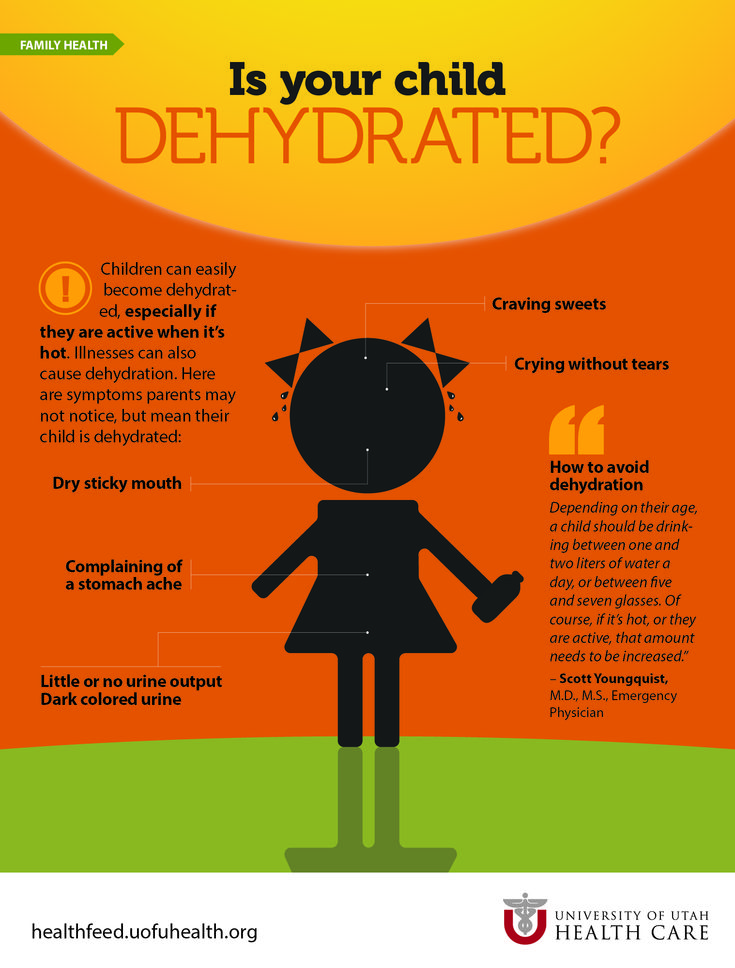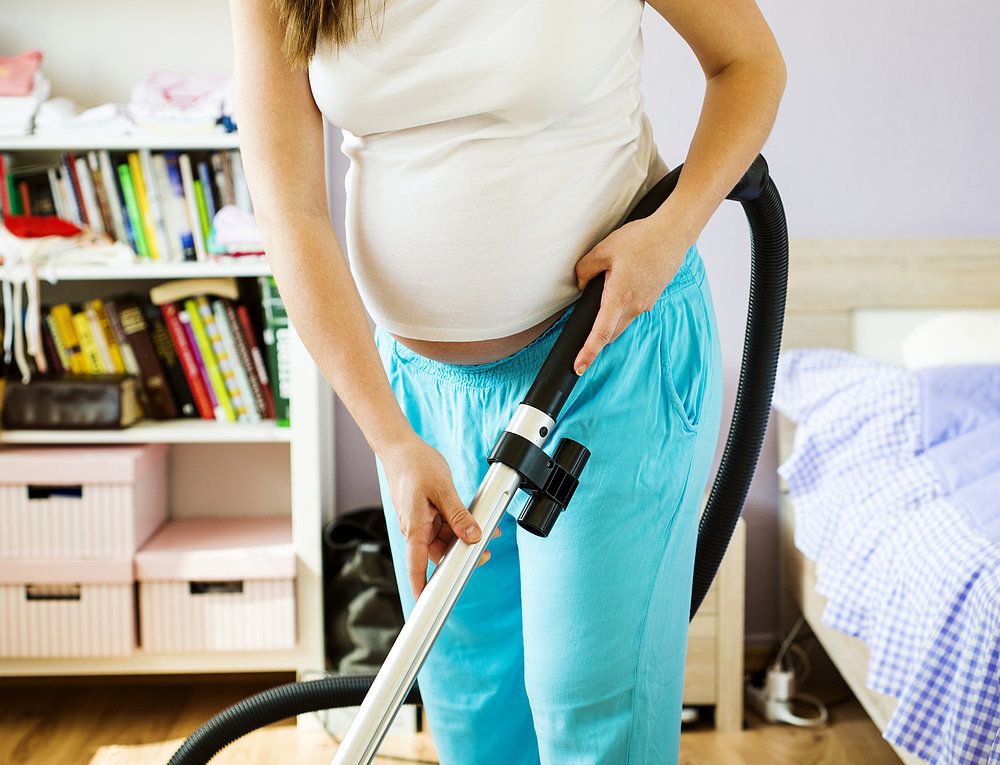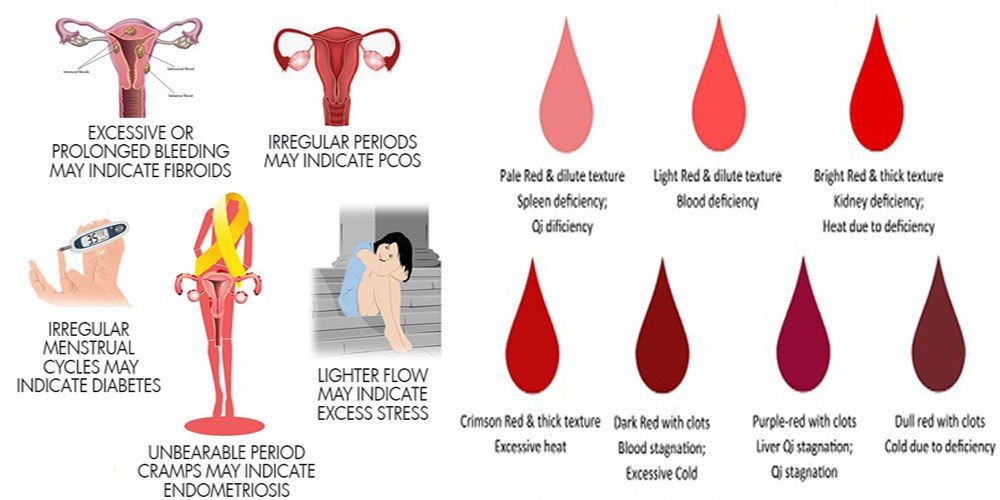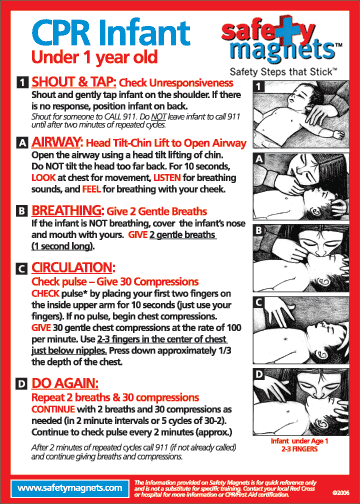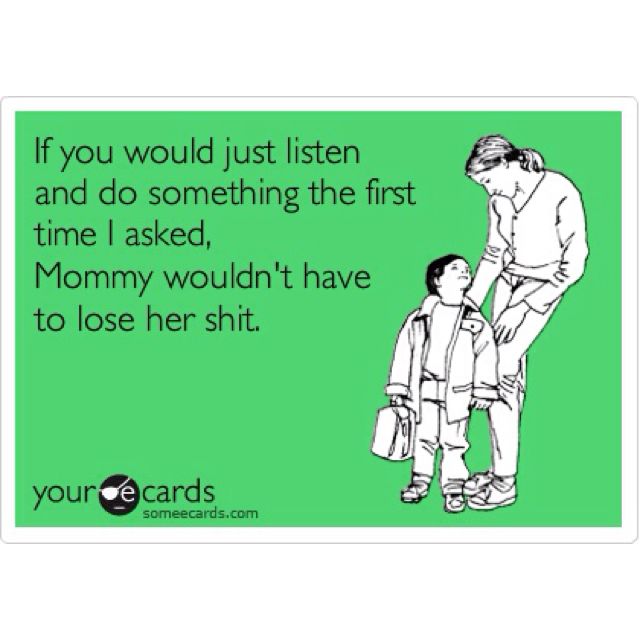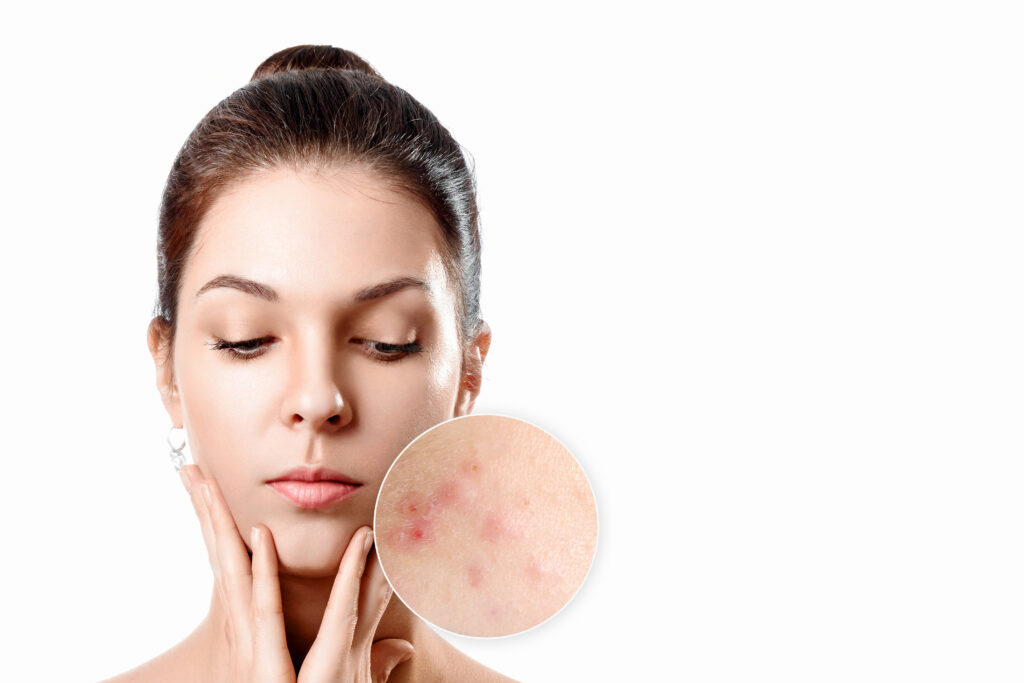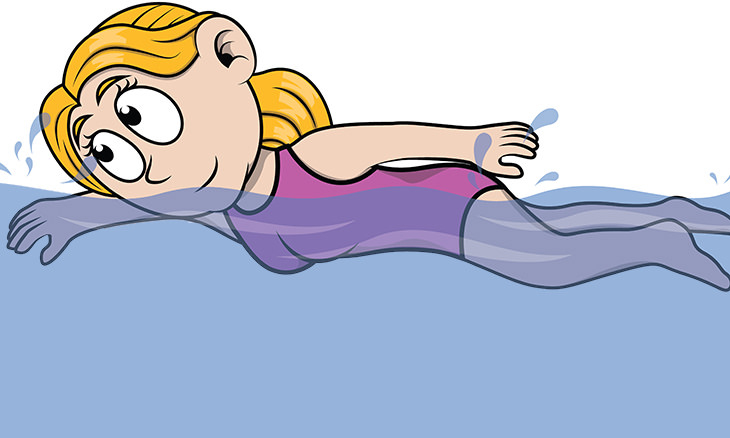How to check for dehydration in a child
Dehydration (for Parents) - Nemours KidsHealth
Reviewed by: Amy W. Anzilotti, MD
en español Deshidratación
What Is Dehydration?
Dehydration is when there is not enough water in the body.
What Causes Dehydration?
Dehydration in children usually is caused by vomiting, diarrhea, or both. It also can happen when children don't want to drink because they have mouth sores or a sore throat. Kids also can get dehydrated in hot weather or when they are very active.
What Are the Signs & Symptoms of Dehydration?
Signs of dehydration include:
- a dry or sticky mouth
- few or no tears when crying
- eyes that look sunken
- in babies, the soft spot (fontanelle) on top of the head looks sunken
- peeing less or fewer wet diapers than usual
- crankiness
- drowsiness or dizziness
How Is Dehydration Treated?
Treatment for dehydration depends on how severe it is. Kids with mild dehydration can get extra liquids at home. Kids with more severe dehydration may need treatment in the ER or hospital.
Mild dehydration is treated with oral (by mouth) rehydration. This usually includes giving oral rehydration solution (such as Pedialyte, Enfalyte, or a store brand). It has the right amounts of water, sugar, and salt to help with dehydration. You can buy it without a prescription at drugstores or supermarkets. If you can’t get oral rehydration solution, talk to your doctor. There are other fluids that can help with dehydration.
If your child has mild dehydration and your doctor says it’s OK to start treatment at home:
- Give your child small sips of oral rehydration solution as often as possible, about 1 or 2 teaspoons (5 or 10 milliliters) every few minutes.
- Babies can continue to breastfeed or take formula, as long as they are not vomiting repeatedly.
- Older children also can have electrolyte ice pops.
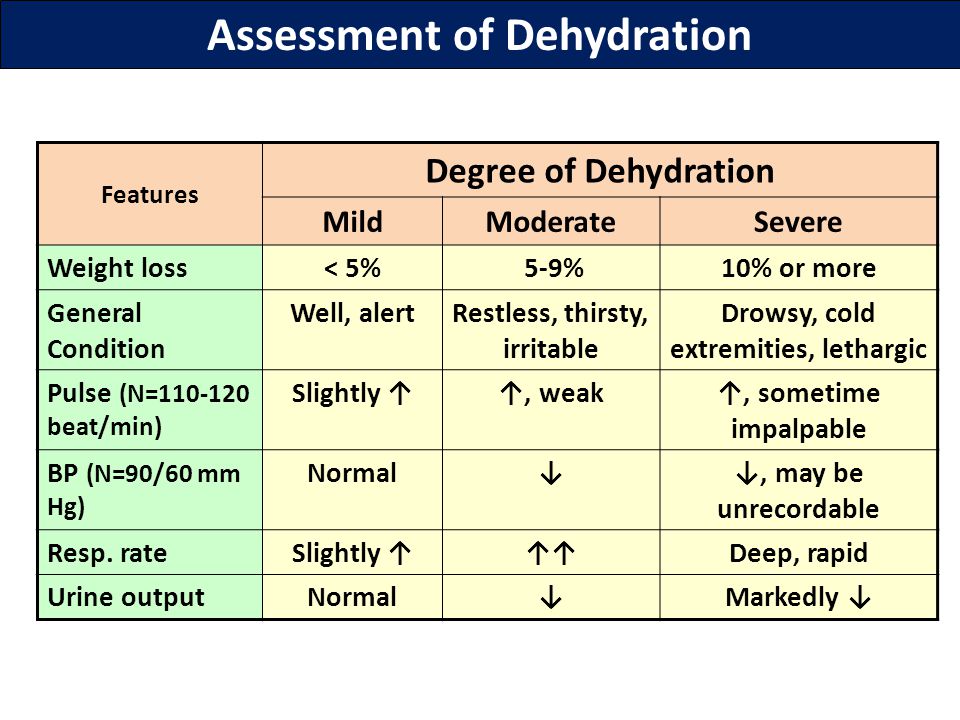
- Kids can keep eating their regular diet, unless the doctor recommends a change. They may not want to eat at first but as long they are drinking, it’s OK if they aren’t eating much solid foods.
- Don't give babies plain water instead of oral rehydration solution. It doesn't have the right nutrients for babies with dehydration.
- Don't give sports drinks, soda, or full-strength (undiluted) juice. They have too much sugar and can make some symptoms worse.
- As your child starts to feel better and have a better appetite, you can give less oral rehydration solution and more of their usual food and drink.
- Don’t give medicines for diarrhea or vomiting unless the doctor recommends it.
When Should I Call the Doctor?
Call your doctor if your child:
- won't take anything to drink for more than a few hours
- is under 1 year old and is drinking only oral rehydration solution (no breastmilk or formula) for 24 hours
- vomits more than a few times in 24 hours
- has vomit that's bright green, red, or brown
- hasn’t started eating some food within 3-4 days
- has signs of dehydration like a dry mouth, peeing less often (or fewer wet diapers in babies), fewer tears, or sunken soft spot (in babies)
- doesn’t seem to be getting better
Go to the ER if your child is very sleepy or isn’t responding to you.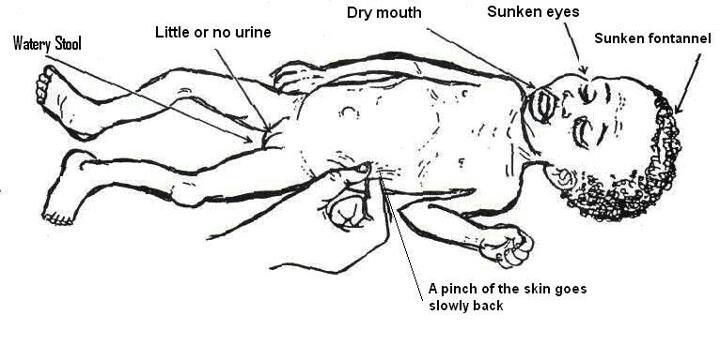
How Can We Prevent Dehydration?
Whenever your child gets sick, give extra fluids or oral rehydration solution. Give small amounts often, especially if your child is vomiting.
Kids need to drink often during hot weather. Those who play sports or are very physically active should drink extra fluids beforehand, and then take regular drink breaks (about every 20 minutes) during the activity.
Reviewed by: Amy W. Anzilotti, MD
Date reviewed: March 2020
Kids Health Information : Dehydration
Dehydration occurs when there isn’t enough fluid in the body to keep it working properly. The body needs water to help maintain body temperature, make bodily fluids and for day-to-day functioning.
Young children and babies are at greater risk of becoming dehydrated than adults. Keeping your child hydrated is important at all times, but especially when they are unwell.
If your child is very thirsty, they are probably already dehydrated.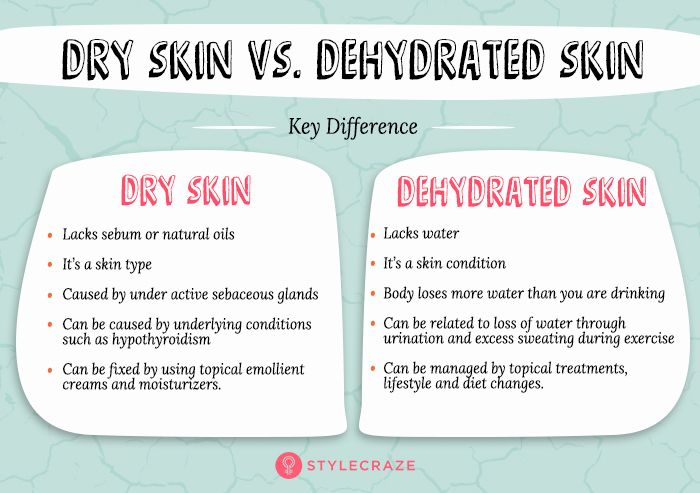 The effects of severe dehydration can be serious.
The effects of severe dehydration can be serious.
Signs and symptoms of dehydration
If your child is mildly dehydrated, they may have:
- dizziness or light-headedness
- nausea or headaches
- dark yellow or brown urine (wee) – urine should be pale yellow
- fewer wet nappies or nappies not as wet as usual; or older children will not go to the toilet as much
- dry lips, tongue, mouth or throat.
If your child has severe dehydration, they may be:
- extremely thirsty
- lethargic or less active than usual
- pale and have sunken eyes, tears may be absent when crying
- cold – especially their hands or feet
- breathing faster than usual and have a fast heart rate
- irritable, drowsy or confused.
If your child shows signs of severe dehydration, see your GP or go to your closest hospital emergency department.
Care at home for mild dehydration
The best treatment for mild dehydration is to give your child more fluid to drink, such as water or oral rehydration solutions.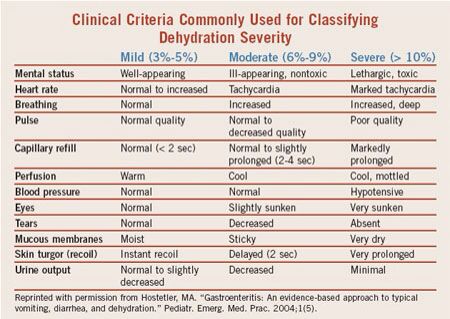 Gastrolyte, HYDRAlyte, Pedialyte and Repalyte are different types of oral rehydration solutions (fluids) that can be used to replace fluids and body salts. These are the best option if your child is
dehydrated, and can be purchased from your local pharmacy or supermarket. They are also available as icy poles, which children are often happy to have.
Gastrolyte, HYDRAlyte, Pedialyte and Repalyte are different types of oral rehydration solutions (fluids) that can be used to replace fluids and body salts. These are the best option if your child is
dehydrated, and can be purchased from your local pharmacy or supermarket. They are also available as icy poles, which children are often happy to have.
If your child refuses water or oral rehydration fluids, try diluted apple juice. You can also give your child their usual milk. Do not give drinks that are high in sugar (e.g. flat lemonade or sports drinks), because they can make dehydration worse.
Infants
If your baby is under six months old, they should always be seen by a doctor if they are dehydrated. For babies over six months:
- If you are breastfeeding your baby, continue to do this but feed more often. You can also give an oral rehydration solution or water for the first 12 hours.
- If you are bottle feeding your baby, replace formula feeds with oral rehydration solution or water for the first 12 hours, then give normal formula in small, but more frequent amounts.
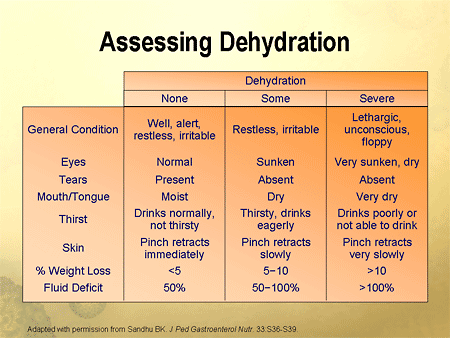
Older children
For older children (over 10 kg) who are dehydrated, give at least one cup (250 mL) of water (or oral rehydration solution) to drink, every hour for four hours. Give them more than this to drink if they are vomiting or have diarrhoea. Your child may want to drink it all at once or drink smaller sips frequently.
Smaller children will need less to drink than older children.
When to see a doctor
Babies and young children are at greater risk of becoming dehydrated. If your child is under six months of age or has a chronic (long-term) illness, see your GP if you think your child is dehydrated.
If your child shows signs of severe dehydration or you are concerned for any reason, see your GP or go to your closest hospital emergency department.
If your child is unwell, they may need medical treatment to help replace lost fluids. This can involve using a feeding tube that goes into the stomach via the nose, or fluids given directly into a vein through a drip (intravenous or IV therapy).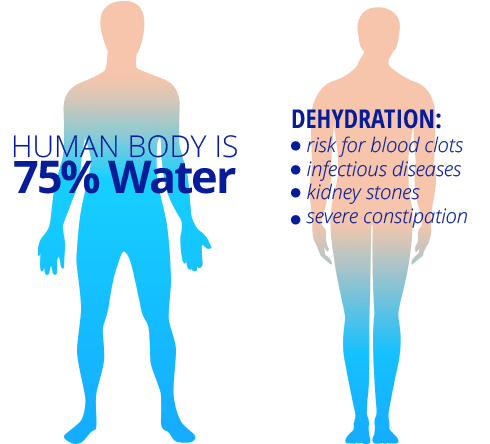
What causes dehydration?
Children are more likely to become dehydrated:
- after lots of physical activity or exercise
- with severe vomiting or diarrhoea
- if they have a fever
- if they take certain medications, such as diuretics
- if they don’t drink enough, especially during times of illness
- if they are younger than six months of age
- in hot weather.
Making sure your child drinks enough water each day can help prevent dehydration. Providing extra drinks of water in hot weather, during and after exercise and during illness is particularly important.
Key points to remember
- Young children and babies are at most risk of becoming dehydrated.
- If your child is very thirsty, they are probably already dehydrated.
- Mild dehydration can be treated at home by giving oral rehydration fluids or water.
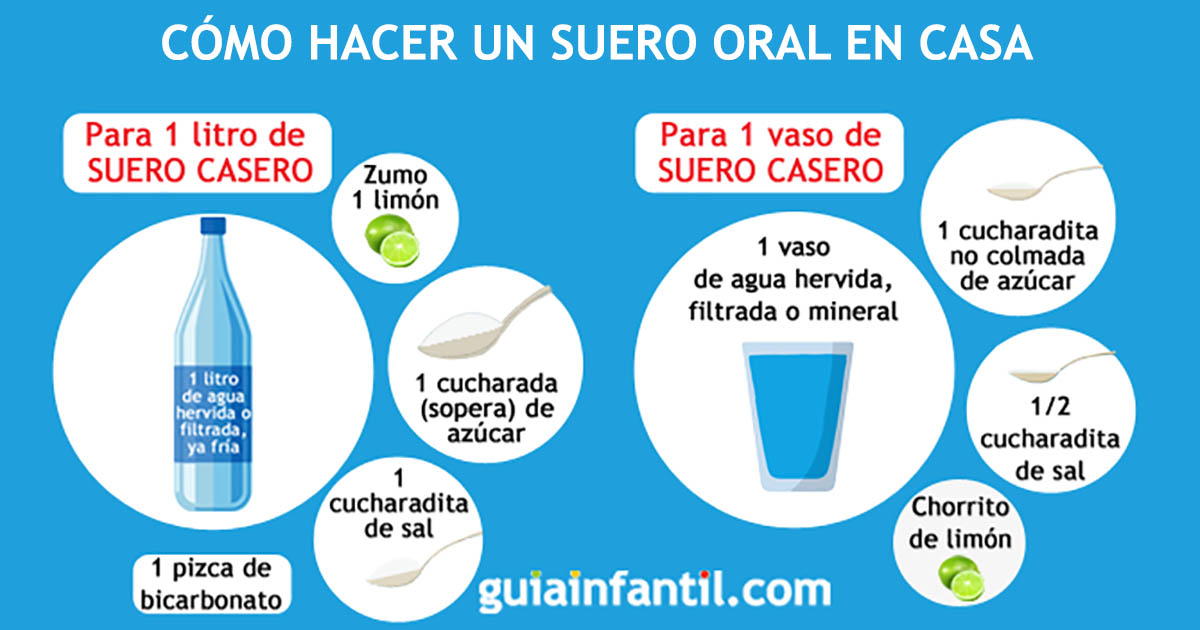 Do not give drinks that are high in sugar.
Do not give drinks that are high in sugar. - If your child show signs of severe dehydration, see your GP or go to your closest hospital emergency department.
For more information
- Kids Health Info fact sheet: Gastroenteritis (gastro)
- Kids Health Info fact sheet: Sun safety
- Raising Children Network fact sheet: Dehydration
Common questions our doctors are asked
Should my child drink sports drinks when playing sports to prevent dehydration?
Sports drinks are not recommended for hydration, as there is often a high sugar content. Drinks that are high in sugar can make dehydration worse. During sports, children can drink water or oral rehydration solutions.
What illnesses are most likely to cause dehydration?
Gastroenteritis is the most common cause of dehydration, because the body loses fluids through the vomiting and diarrhoea, and oral intake is usually reduced.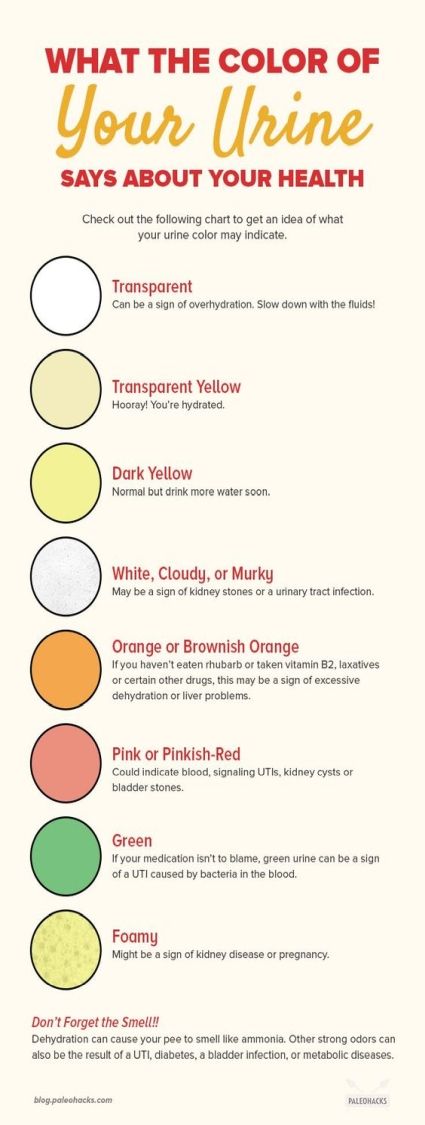 Illnesses where children have a sore throat or sore mouth (e.g. tonsillitis or hand, foot and mouth disease) can lead to
dehydration if the pain is making your child reluctant to eat or drink. Having a high fever is also linked with dehydration, because your child is losing fluids through sweating.
Illnesses where children have a sore throat or sore mouth (e.g. tonsillitis or hand, foot and mouth disease) can lead to
dehydration if the pain is making your child reluctant to eat or drink. Having a high fever is also linked with dehydration, because your child is losing fluids through sweating.
Developed by The Royal Children's Hospital Community Information and Anaesthesia and Pain Management departments. We acknowledge the input of RCH consumers and carers.
Reviewed August 2018.
Kids Health Info is supported by The Royal Children’s Hospital Foundation. To donate, visit www.rchfoundation.org.au.
Dehydration in a child: symptoms and prevention
home
reference Information
Resources for Parents
Dehydration in a child: symptoms and prevention
Dehydration is a pathological condition in which the body loses fluid and, along with it, salts and minerals.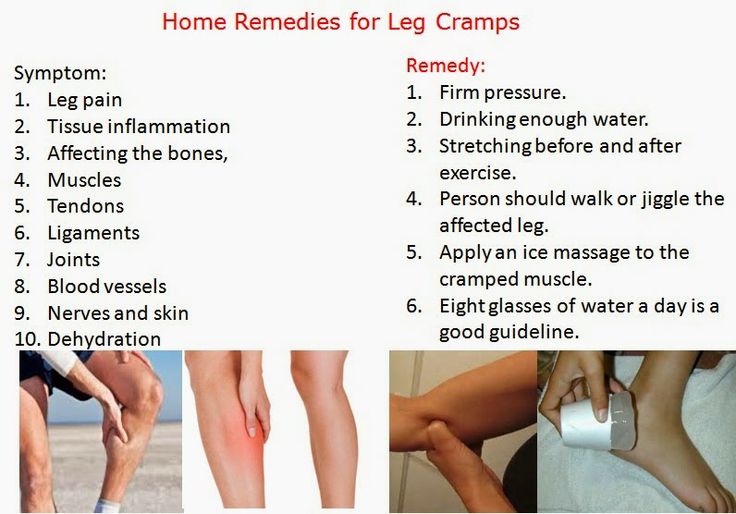 Infants and young children are especially at risk of dehydration because they lose fluid faster than adults. nine0014
Infants and young children are especially at risk of dehydration because they lose fluid faster than adults. nine0014
Causes of dehydration
1. Difficulty in the flow of fluid into the body. This situation is rare. This may be the refusal of the child to drink liquid, for example, due to pain when swallowing. Or these are severe pathological conditions in which the child cannot swallow on his own.
2. Increased excretion of water and minerals by the body, when the loss of fluid exceeds its intake. This situation is observed in acute infections, food poisoning, parasitic damage, overheating, burns. nine0003
Signs of dehydration in a child: dry mucous membranes, shallow breathing, rapid pulse, low blood pressure, lethargy and irritability; decreased frequency of urination, deformation of the fontanel, lack of tears when crying.
Dehydration is a very dangerous condition, especially for children. Its most common cause is a viral infection with the following manifestations: high fever, loss of appetite, loose stools, vomiting.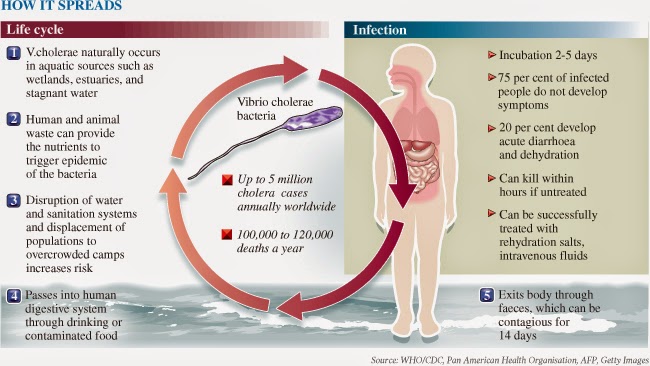
In many cases, the infection is caused by rotaviruses.
Dehydration can also be the result of the formation of wounds in the child's mouth, because they are also the result of the entry of the virus into the body. Painful mouth ulcers make it difficult for a child to eat and drink normally. Dehydration can also occur as a result of intense sweating, so on hot days you should make sure that the child consumes more fluids than usual. Always carry a bottle of water with you. nine0003
2. Symptoms of dehydration in children
The first symptoms of dehydration in infants and children are as follows: chills, weakness, crying without tears, dry mouth. In severe cases, symptoms include dry skin, a change in the smell and color of urine, and a decrease in the amount of urination. Having recognized these symptoms, it is worth thinking about how to restore the water balance of the body as soon as possible.
How to quench a child's thirst?
Water
Pediatricians always recommend water to quench your thirst.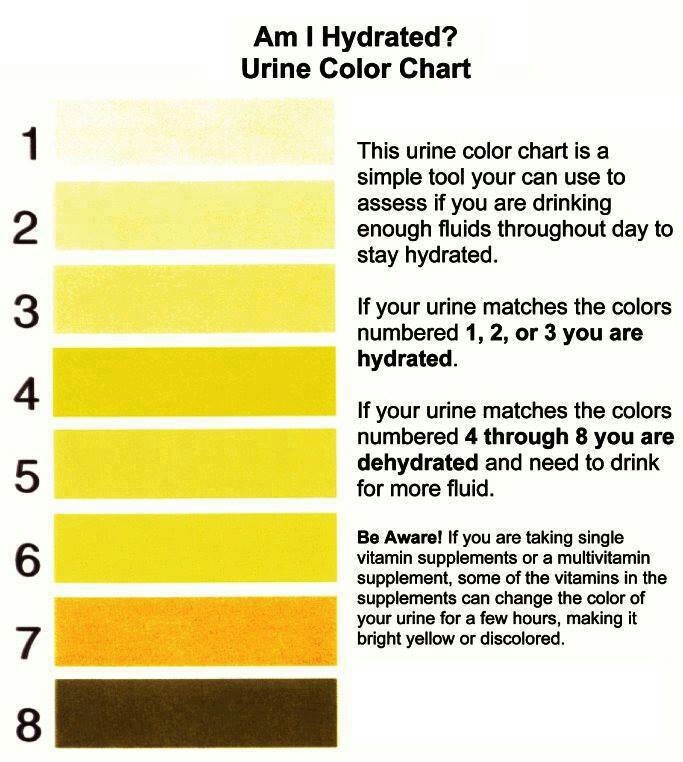 Drinking water will not cause a child to lose their appetite and will not have problems with tooth decay and obesity in the future, unlike the consequences of drinking sugary drinks. nine0003
Drinking water will not cause a child to lose their appetite and will not have problems with tooth decay and obesity in the future, unlike the consequences of drinking sugary drinks. nine0003
A baby only needs a few teaspoons of water a day. When he shows that he is no longer thirsty, stop the process and give the next dose in a few hours.
The water given to the child should be boiled and cooled. Even tap water filtered with special filters is not suitable for direct consumption by a child, as it contains many chemicals and metals that can be harmful to health.
Teas nine0003
Teas are also recommended for children, but only in small amounts, as babies often like the sweetened drink. You can also give your child juices, preferably diluted 1:1 with water. The most useful are low-sugar juices containing pulp, without dyes and preservatives. They are meant to be safe for children to consume.
How to avoid dehydration?
If you have already experienced the annoying problem of dehydration in your child, do not rush to panic! Read the detailed description of actions on how to avoid this phenomenon. nine0003
nine0003
Give your child a small amount of water several times a day
Breastfeed your baby more often, especially in hot weather
Use drinking water, chamomile tea and light fruit infusions
Check the temperature of drinks before serving it to the child - it should be at room temperature
Remember that hot days can be dangerous not only for your baby, but also for you. At this time, be sure to have a bottle of water with you separately for yourself and your baby. When a child's dehydration is so severe that he looks visibly weak and lethargic, see a doctor as soon as possible. nine0003
In extreme cases of dehydration (accompanied by fever and diarrhoea), we are talking about inpatient treatment and the installation of a drip under the supervision of doctors
What Diet Should You Follow During Dehydration?
The most important rule during dehydration is the constant filling of the body with fluid. Not only oral rehydration fluids, but also some dietary changes play a key role in solving this problem.
Fruits and vegetables are best for consumption. Liquid products are also ideal.
It is very important to provide the child's body with the necessary nutrients that enter it with food. Your baby's diet should be free of complex carbohydrates (potatoes, rice, whole wheat bread, cereals), lean meats, and yogurt. The diet should be appropriate for the age of the child.
Prevention of conditions that contribute to dehydration.
First of all, you need to try to protect the baby from intestinal infections. Vaccination is a specific preventive measure. A vaccine against rotavirus infection has now been developed. It is administered to a child from 2 to 8 months of age three times. And it protects the baby's body in 85% of cases from infection and in 100% of cases from a severe course. nine0003
Nonspecific prevention of intestinal infection is the observance of hygiene measures: frequent hand washing, reducing contact with sick children.
If the infection could not be avoided, then the child should be shown to the pediatrician.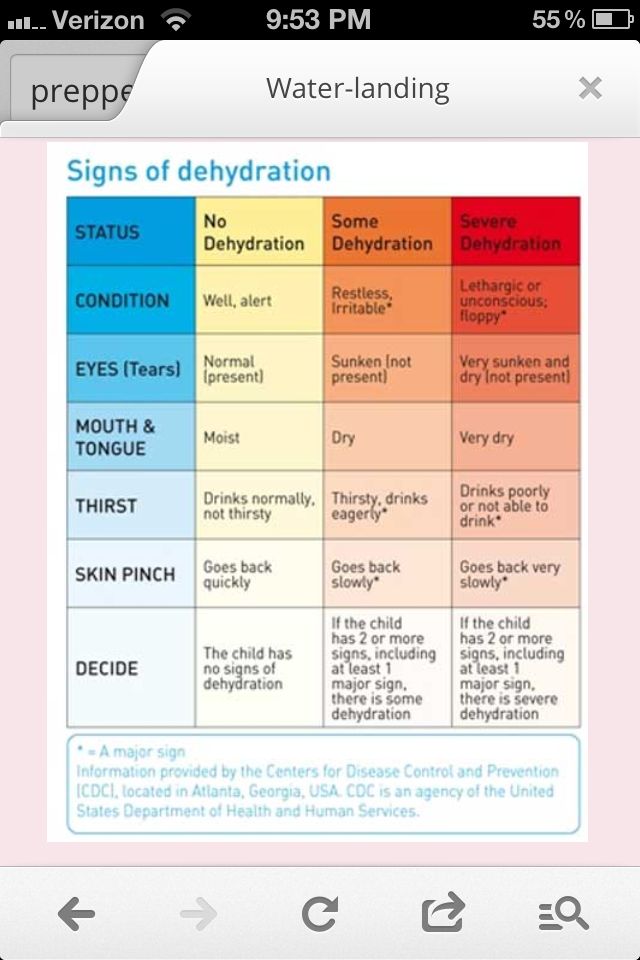 And start to solder with water on your own, even before the doctor arrives.
And start to solder with water on your own, even before the doctor arrives.
Share:
Dehydration in children: how to prevent and recognize
Latest news
Dehydration is a situation where the human body loses a large amount of fluid necessary for the functioning of vital organs. nine0003
Why are children at risk and more likely to become dehydrated?
Children, along with the elderly, are at risk and more than susceptible to getting dehydrated due to a combination of several factors:
First because they are a group of people who older adults are more likely to suffer from infections, which can cause fever and gastrointestinal symptoms such as vomiting or diarrhea that lead to fluid loss in the body. However, dehydration can occur not only with gastroenteritis, but with other infections, such as respiratory (colds, sinusitis, pneumonia, bronchitis) or urinary tract infections.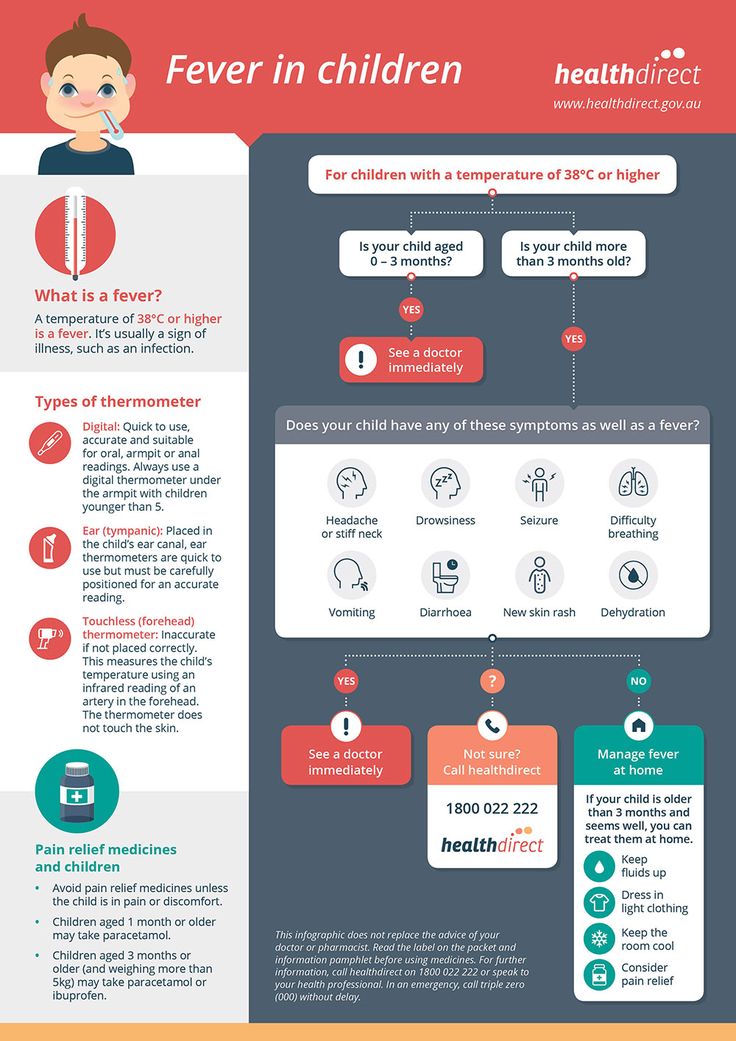 nine0003
nine0003
Second , because in the child's body a higher percentage of water . In a newborn, for example, about 70% of his body weight is water. This percentage gradually decreases as the child grows up, until it reaches 50-60% in adulthood, depending on age and gender.
Thirdly, , because with a smaller body volume, the ratio between body surface and weight is higher than . This means that in children, the loss of moisture through the skin and mucous membranes by evaporation is proportionally greater than in adults. nine0003
It should also be added that the compensation mechanisms that the body starts when it begins to lose moisture, more are underdeveloped at an early age of life. The ability to concentrate urine and thereby reduce water loss is less in a newborn than in a school-age child or adult, making young children more vulnerable in these situations.
Finally, in the case of young children, they have limited access to fluids because they0093 cannot drink on their own and depend on adults to provide them with water to drink in situations of dehydration due to illness or hot weather.
Thus, newborns and infants are most at risk of dehydration.
Dehydration and medications for chronic conditions
Although children often need to take medications for chronic illnesses, be aware that some medications can exacerbate symptoms of dehydration . An obvious example of this type of drug is the diuretics (furosemide, spironolactone...) which increase the loss of water through the urine to compensate for problems with the heart, kidneys, etc.
It should also be taken into account that if a child is taking any medications for chronic diseases, their blood levels, as well as their therapeutic effects (both beneficial and adverse), may temporarily change when a situation of dehydration occurs. This does not mean that we should be worried, but we should consider it, for example, in the case of children receiving antiepileptic drugs , because in a situation of dehydration, the drugs will no longer work and the epilepsy may temporarily decompensate.
What are the symptoms of dehydration?
On the one hand, symptoms are associated with the loss of fluid and electrolytes (mineral salts), and on the other hand, with compensation mechanisms that the body triggers to restore the loss of moisture. Some of the symptoms of dehydration: it is important to see a doctor as soon as possible .
How can dehydration be prevented?
In the situations of symptoms described above (fever, vomiting, diarrhea), it is very important to offer the child plenty of fluids to maintain a normal state of hydration. In addition to water, the liquid you offer your child should contain glucose (sugar) and mineral salts because not only water is lost during vomiting and diarrhea, but also sugar and minerals such as sodium, potassium and chlorine. These substances are vital for maintaining the functioning of the organs and systems of our body.